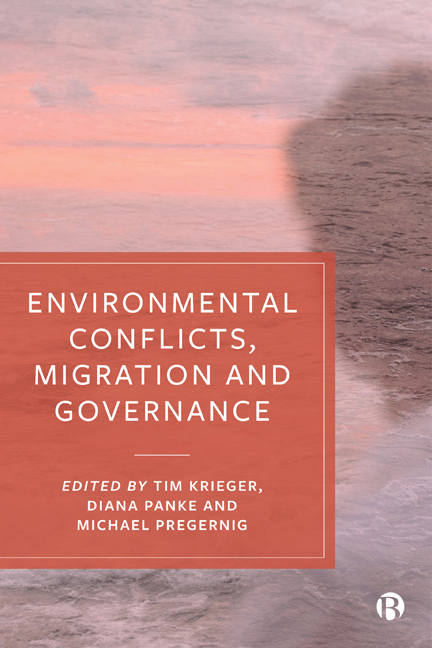Book contents
- Frontmatter
- Contents
- List of Figures and Tables
- List of Acronyms
- Notes on Contributors
- Acknowledgements
- 1 Environmental and Resource-Related Conflicts, Migration and Governance
- 2 Renewable Resource Scarcity, Conflicts and Migration
- 3 Extractive Resources, Conflicts and Migration
- 4 Climate Change, Conflicts and Migration
- 5 The Individual Level: Selection Effects
- 6 The Individual Level: Sorting Effects
- 7 Migration Governance at the State Level: Policy Developments and Effects
- 8 Environmental Migration Governance at the Regional Level
- 9 Migration Governance at the Global Level: Intergovernmental Organizations and Environmental Change-Induced Migration
- 10 The Link between Forced Migration and Conflict
- 11 Conflict-Prone Minerals, Forced Migration and Norm Dynamics in the Kimberley Process and ICGLR
- 12 On the Nexus Between Environmental Conflict, Migration and Governance: Concluding Remarks
- Index
3 - Extractive Resources, Conflicts and Migration
- Frontmatter
- Contents
- List of Figures and Tables
- List of Acronyms
- Notes on Contributors
- Acknowledgements
- 1 Environmental and Resource-Related Conflicts, Migration and Governance
- 2 Renewable Resource Scarcity, Conflicts and Migration
- 3 Extractive Resources, Conflicts and Migration
- 4 Climate Change, Conflicts and Migration
- 5 The Individual Level: Selection Effects
- 6 The Individual Level: Sorting Effects
- 7 Migration Governance at the State Level: Policy Developments and Effects
- 8 Environmental Migration Governance at the Regional Level
- 9 Migration Governance at the Global Level: Intergovernmental Organizations and Environmental Change-Induced Migration
- 10 The Link between Forced Migration and Conflict
- 11 Conflict-Prone Minerals, Forced Migration and Norm Dynamics in the Kimberley Process and ICGLR
- 12 On the Nexus Between Environmental Conflict, Migration and Governance: Concluding Remarks
- Index
Summary
Introduction
Today, the question of migration from the South to the North unquestionably tops the agenda of almost all industrialized countries (Dancygier, 2010; Collier, 2013). However, it is not a new topic for populations that throughout history were subjected to both forced (slavery and imprisonment) and uncoerced migration across vast oceans. Nevertheless, the discussion on migration nowadays is portrayed as something new and immigrant states are dominated by questions regarding native jobs, crime, Islamophobia, racism and terrorism (from Islamists, right-wing extremists and others). These concerns have led to the ‘politics of fear’, which drives support for populistic parties throughout the northern world (Wodak, 2015; Miller, 2016). The popular understanding of why people from least developed countries might want to migrate to more economically developed countries is informed by many factors, but chiefly it is that they seek better opportunities abroad due to political persecution and economic scarcity. Economic scarcity is now also linked to natural resource scarcities brought about by climate change, dwindling renewable resources (for example, soil and water) and unpredictable weather-related disasters, or altered migratory patterns of pastoralists (see Chapter 2 in this volume). This chapter argues differently, by stating that economic decay and scarcity are also likely to be present under conditions of natural resource abundance, particularly of non-renewables, where ‘unearned income’ from natural resource wealth drives poor governance and predatory politics. These factors, in turn, generate ‘forced’ small-and large-scale migration, both indirectly due to economic hardship, and directly due to armed coercion, repression and civil war.
Theory and empirics support the propositions related to the ‘natural resource curse’ that view unearned income from resources as a path to socio-political and economic failure. Apart from renewable resources, which may also create push factors for migration, there is a great deal of evidence suggesting that extractive economic activity, particularly of petroleum resources, can cause direct effects on forced migration due to what is termed here as ‘looting and uprooting’. This chapter argues that in contexts of natural resource abundance, rather than scarcity, failure of governance is far more likely to happen, as seen in cases like Venezuela or Nigeria today. Tackling the question of bad governance is likely to be critical for solving both small-and large-scale migration.
- Type
- Chapter
- Information
- Environmental Conflicts, Migration and Governance , pp. 37 - 58Publisher: Bristol University PressPrint publication year: 2020



